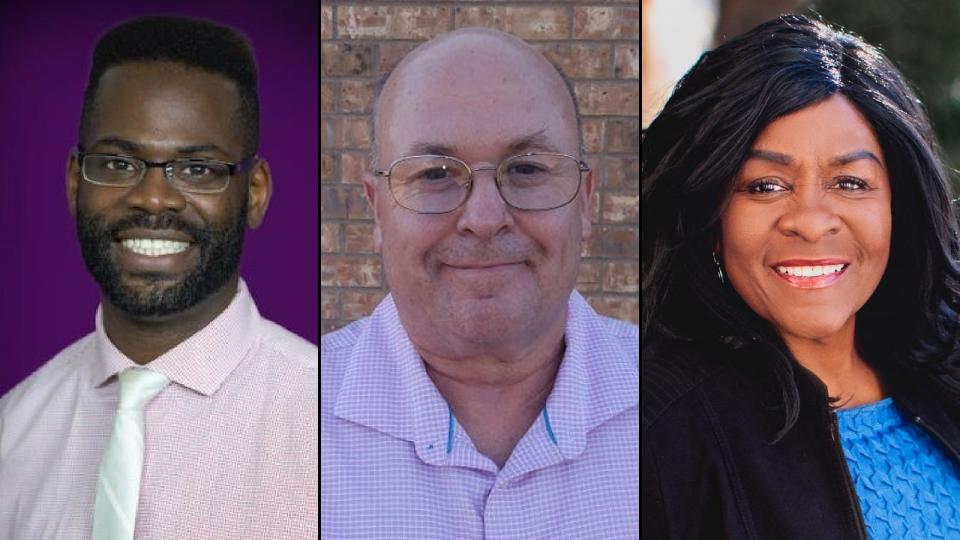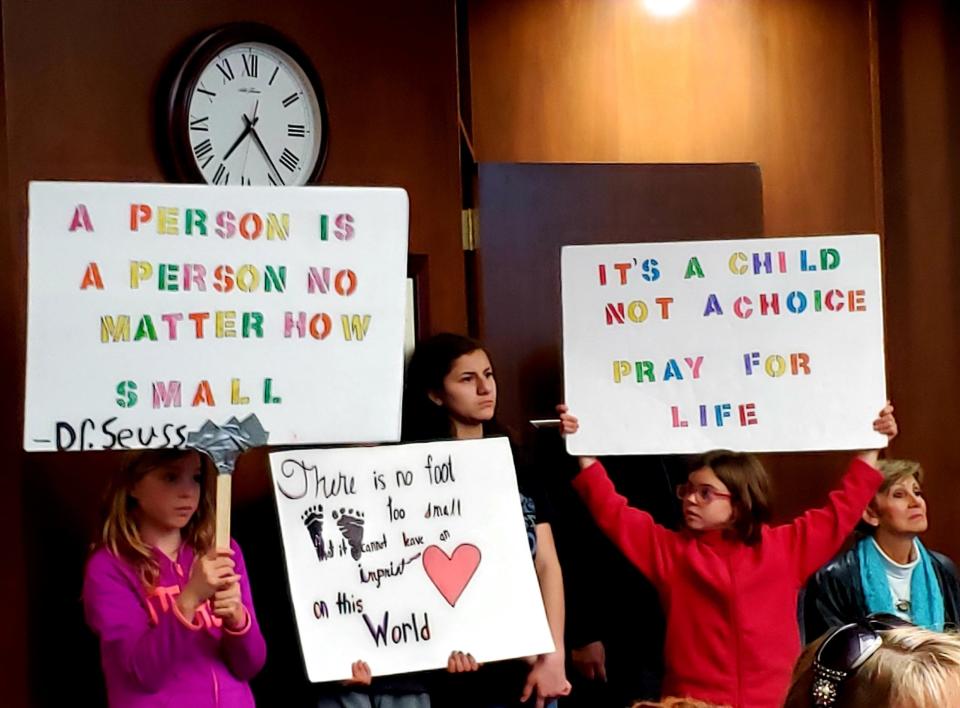Abilene City Council candidates showcased their contrasts in Hispanic Leadership forum
The Hispanic Leadership Council last week held separate forums, one for the three seats up for election on the Abilene Independent School District board of trustees members, the other for those running for two Abilene City Council positions.
Early voting begins April, with the election set for May 7.
Here is an overview of Thursday's council forum.
Place 5: Personal perspectives
A bit of harmony, and a heaping helping of differing opinions, were served as five candidates — two first-time, two incumbents and one repeat — squared off on issues ranging from sanctuary cities for the unborn to more traditional fare such as streets and housing.
James Sargent, a veteran, small-business owner and foster parent of two girls, took an everyman approach to his answers, introducing himself by saying he was used to overcoming challenges, whether it be his own or those of others.
He would bring to Place 5 “the same stuff I bring to my everyday life,” he said, namely hands-on involvement and a desire to diligently research topics.
Place 5 incumbent Kyle McAlister, who has been on the council since 2013, leaned on the “knowledge and experience” multiple terms have given him, including his own experiences working for others, being self-employed and – for a time – being unemployed after controversy in his previous run.
Those perspectives, he said, help him when it comes to trying to understand how people want the council to spend their tax dollars, which he said is the entity's primary responsibility.
Place 6: 'Change agents'
Dorothy Clay, running for Place 6, said she came to the council through a desire to be a “change agent," wanting to bring “fairness and justice” to the work of the council.
She said the city should communicate better with residents about needs and concerns.
Charles Byrn, making a second run at Place 6, said he would be someone who would listen to residents, “not just a certain group of people."
He also, he said, will be “someone on the council that will vote no” on items that are not needed.

"We spend way too much money on frivolous things," he said.
Incumbent Travis Craver said he, too, believed strongly in being a "conduit of change," stating in a second term, he would continue to “do the hard work” required.
Oftentimes, he said, issues are often “much broader” than they may appear and require "someone who's willing to do the due diligence.”
It doesn’t just boil down to "yes" or "no," but understanding "why," he said.
The roads ahead
On street maintenance, Clay said there should be better ways for residents to call and complain about issues, drawing from examples in other cities.
Byrn argued he had “solutions" for streets, the first in the form of a branded product, American Road Patch, which he said is already used by Big Spring's mayor, a supporter, to fill potholes.
He said he also has been talking with the city’s engineer to put together a cost analysis of concrete versus asphalt for street repairs, since concrete offers an advantage in longevity.
Craver said it was important to understand what the city already has done about street projects, including a 2015 bond that allocated $46 million for repairs and the implementation of a street maintenance fee after a voter referendum.
Combined, the city has so far spent almost $105 million "to rectify what we've done with streets,” Craver said, including money from the Development Corporation of Abilene.
"We are actively getting the ball rolling,” he said.
Strengthening services
Place 5 candidate Sargent lamented that the city’s pavement quality, according to a recent survey, continued to fall, while previous bond packages that included streets have been of ever-increasing size.
One immediate help, he said, would be building up the street services department itself, which he said was experiencing labor shortages due to personnel lost to the Texas Department of Transportation and to oilfield work.
McAlister said it’s important to understand that road conditions overall have dropped because the city has, until recently, focused primarily on "major repairs to some major roads.”
Since the implementation of the maintenance fee, “we are not kicking that can down the road anymore," but ongoing repairs are destined to be "a long process" and are often dictated by factors such as time of year and available materials and crews.

A place to call home
On the topic of affordable housing for middle income earners, Byrn said builders needed to be given incentives instead of paying high permit costs.
“Get the government out of the way, let the builders do what they do best,” he said.
Craver shot back if one was “thinking about incentivizing, but yet we're talking about getting government out of the way, who do you think is involved?”
Craver embraced infill development as a way to effect renewal.
Also valuable, Craver said, is incentivizing employers to bring good jobs to town, which can in turn help people afford good homes.
McAlister said real estate costs are “out of control” throughout the country.
But he agreed with Craver about the use of infill development, as well as incentives the council can invoke for developers to get “a little bit of a break on ... upfront costs."
Incumbents also mentioned specialized concepts such as Neighborhood Empowerment Zones and Tax Increment Reinvestment Zones as tools the council can use to encourage growth in some areas.

Many people don’t know about existing programs, such as incentives for first-time homebuyers, Sargent said.
He would like to see grants through the Department of Neighborhood Services used to revitalize neighborhoods and bring them up to code, while reducing red tape and bureaucracy for construction companies, he said.
Clay has spoken to many who were concerned about the high price of home ownership and agreed options for help should be clarified.
She wanted to see collaboration between multiple parties to come up with solutions based on what’s best for residents, whether building new or renewing old properties.
Sanctuary city
On the topic of sanctuary cities, McAlister, who is anti-abortion, said the council “doesn’t get to pick and choose which laws we want to defend and not defend."
“The sanctuary city for the unborn wants the city to make something illegal that is currently legal,” something he said would cause an outcry, likely from some of the same supporters, if the same approach was applied to guns.

Craver said some issues are council issues, such as "business, streets, fire and so on," and some are “citizen issues.”
When it comes to being an agent of change for what amounts to an "an individual decision," he said, residents can join or financially support boards that ally with their convictions to be a be a "conduit of change" for such issues.
Being a council member requires a degree of impartiality no matter one's convictions, he said, and following the law.
"We can't have one agenda, we can't have an ax to grind," he said.
'Culture of life'
Sargent argued the U.S. Constitution openly discusses "the right to life," and said he didn't feel constituents should have to protest to be heard — as some have in a lengthy petition process.
Clay similarly said she believed residents had the “right" to make Abilene a sanctuary city, encouraging a "culture of life and light ... regardless" of precedent set by Roe vs. Wade.
Byrn said the issue is "near and dear" to him because of a family member, and said he first introduced the concept to the council in July 2019.
“It's not just words," he said of his devotion to the cause. "I've been in front of abortion clinics. I've talked to the women that go into these clinics.”
Similar ordinances have been upheld in state and federal courts, including a recent affirmative vote in Lubbock, he said.
Brian Bethel covers city and county government and general news for the Abilene Reporter-News. If you appreciate locally driven news, you can support local journalists with a digital subscription to ReporterNews.com.
This article originally appeared on Abilene Reporter-News: Abilene City Council candidates showcase their contrasts in forum

